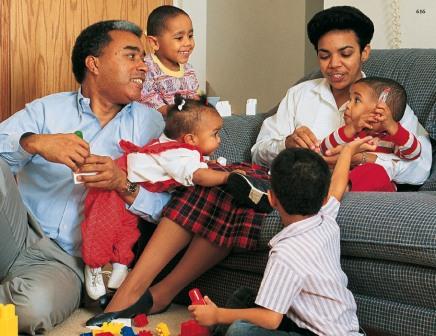A few Sundays ago I finally admitted to myself and my friends that this new home focus for church has been really hard for me. I had not had a lot of success using the Come Follow Me—For Individuals and Families resource to get my autistic son to pay attention and learn from the lessons shared. I needed help to adapt.
 As I shared my frustrations, the women I shared with had a lot of suggestions for how things were working for their families. Each one of them was good, but not quite what would work for my son. That night I told the Lord my struggle, and He whispered a few ideas to me that I love. I have since done some thinking and learned a few great things. I want to share them with you in case you are struggling too.
As I shared my frustrations, the women I shared with had a lot of suggestions for how things were working for their families. Each one of them was good, but not quite what would work for my son. That night I told the Lord my struggle, and He whispered a few ideas to me that I love. I have since done some thinking and learned a few great things. I want to share them with you in case you are struggling too.
1. You won’t be able to teach your autistic child the same way you teach other children.
I’m sure this is not news logically. But it sure was news emotionally to me. I only have one child. So for me, teaching my son is just the norm. However, I have been trying to teach him the way I would learn, and that is not working for us — so I am grateful the Lord spelled it out for me. This is the first tip I’m sharing because getting my head into the right space has made a huge difference.
2. Use the concepts in the lesson instead of the lesson itself to teach your child.
When my son was young, we had lessons on topics instead of following the lesson plans in the Family Home Evening book. He really seemed to absorb the concepts. The new style uses a lot of scriptures to illustrate and expand on ideas. That works for me and other adults, and it may work for some kids.
However, each time we pull out a book or let go of eye contact, we lose my son’s attention — so my new way will be to read and understand the lesson beforehand. Keeping the books put away allows for better eye contact and interaction. I enjoy hearing my son’s input into the conversation.
3. Use hands-on items to teach.
 A few weeks ago in the Primary version of Come Follow Me, they talked about baptism. They suggested using water to show how it removes dirt from something. It was a hands-on illustration of how baptism washes away our sins from our souls.
A few weeks ago in the Primary version of Come Follow Me, they talked about baptism. They suggested using water to show how it removes dirt from something. It was a hands-on illustration of how baptism washes away our sins from our souls.
It reminded me how much I love hands-on lessons. It makes the concepts so easy to absorb, and what could be a boring “forced sit down” can be so fun that you lose track of time. I remember once teaching a lesson about family while making cookies. I don’t think my son ever thought we were doing more than cooking that day.
4. Keep things moving. Pausing loses attention.
Like a lot of kids on the spectrum, my son also has ADD and gets distracted easily, so we make it a point to keep things going. We try not to have long pauses while one of us finds our footing. I find that if I am really prepared for the lesson, I can actually pull the whole thing into a conversation.
I can also follow where my son’s interest goes and still make the lesson’s points even if it is slightly different than I had originally intended. It also helps me pull the conversation back to the lesson when it goes off topic, which it will.
5. Remember to keep it informal.
When I was growing up, my parents had formal family home evenings. We would gather and sit in a row on the couch, and we had a regimented FHE. Every week. My parents were wonderful at doing it every week, even when it was a disaster. For my own family, a formal FHE doesn’t work.
 We make sure to have the same basic structure every week, but I have found that we can’t have as many steps as my parents needed to include everyone. We use only three steps for our FHE right now. That may change, but doing a lesson, activity, and dessert seems to get it all in. As we spend more time on activities to teach a concept, or adapt to our son’s attention needs, I can feel that we are doing the right thing.
We make sure to have the same basic structure every week, but I have found that we can’t have as many steps as my parents needed to include everyone. We use only three steps for our FHE right now. That may change, but doing a lesson, activity, and dessert seems to get it all in. As we spend more time on activities to teach a concept, or adapt to our son’s attention needs, I can feel that we are doing the right thing.
6. Have a family goal setting meeting.
It was so fun when we made some goals as a family. We sat down in a room without distractions and came up with three things we could work on. We chose these:
- Attending church weekly. (My son really struggles with large groups, so this is a difficult one for him.)
- Weekly FHE. (This one is hard for me, because so much of it falls on my shoulders and we are already a busy family.)
- Weekly scripture study. (My goal is to increase that over time, but we need to start somewhere.)
I took time to print our goals out into a cool sign, and then laminated it. It’s fun to check each one off each week once we accomplish them.
7. Let them teach a lesson/group FHE.
 My friends suggested that we try a couple things. They thought that having my son teach the lesson could be beneficial. I agree. But not till he is older. Right now he would probably try to connect the Holy Ghost to Fortnight and I don’t think that is quite the point.
My friends suggested that we try a couple things. They thought that having my son teach the lesson could be beneficial. I agree. But not till he is older. Right now he would probably try to connect the Holy Ghost to Fortnight and I don’t think that is quite the point.
Another friend suggested a group FHE, or having FHE at her house. She is a sweet older woman, and has grandchildren and great grandchildren. I can see that being a lot of fun — but I worry that my son won’t really listen. We will probably try that idea out sometime soon, and I can let you know how it goes. I think for some children, this would make a big difference.
8. Focus on Christ.
I’m sure this tip is no surprise; however, there was a long time where I wasn’t sure how easy it would be to teach my son about the Savior. But each time we talk about Jesus, he lights up! It’s so easy to connect concepts to our lives when I remember how much God loves us and wants us to be happy.
This afternoon I overheard my son talking to a friend as he played computer games. His friend was struggling with something, and my son was telling him how he should pray for help for things that matter to him. It warmed my heart. I knew then that my efforts have not been wasted — and hopefully his friend will also grow closer to God as he prays for the desires of his heart.
9. Prayerfully search for teaching moments.

To read more of Abby’s articles, click here.
That leads me to my last point: prayer. We are not the only ones who love our families beyond reason. God does too. You are a team, and together you will accomplish great things. As we keep our families in our prayers and share our struggles, God will help us. He wants His children back, and He will help us adapt these lessons for our families.
I have prayed for teaching moments, and He has provided them. My son surprises me on a regular basis with his depth of understanding about eternity. Sometimes I think he gets it more than others because he has to work so much harder than other kids to master some things. Prayer is never a mistake — and as we learn to hear God’s voice better, we will recognize more teaching moments. I love knowing that I am not the only one working for my family’s success.
About Abby Christianson
Abby is capable and caring. She is learning more about Autism and parenthood every day. Having completed training to be an RBT (Registered Behavior Technician) for ABA therapy she is beginning to understand her son. And even though she is the first to admit she makes a lot of mistakes, she is so grateful to be on this journey. She comes from a family with many autistic members. She invites us to join her, as she shares her adventures. She wishes to emphasize that Autism is a difference not a defect. If you or a family member have autism, Abby wants you to know that the challenges can be overcome, and there are blessings in autism. You or your loved one are not sick or broken. Together we will teach the world this new language.
Twitter •






